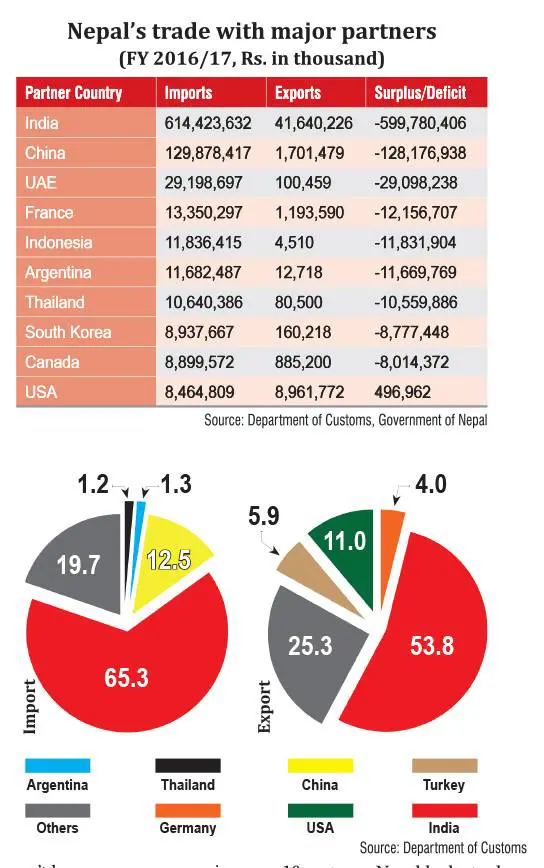As
the two largest global economies – China and the United States of
America – are trying to reach to each other’s throat with new taxes and
quota system in goods exchange, the rest of the world, especially the
Asian economies, are biting their nails fearing that further push of the
trade belligerence could result in the debacle of the regional as well
as the international trade.
Much
worse to this, the stock markets around the globe tumbled last week
giving base to these fears, Germany’s DAX, France’s CAC, Britain’s FTSE,
USA’s DOW Jones and S&P/500 as well as Japanese Nikkei, South
Korea’s Kospi, Hong Kong’s Hang Seng, China’s Shanghai Composite,
Australia’s S&P/ASX and all went red.
The
US trade deficit with China reached $375 billion in 2017 and the Trump
administration has been mulling over tariffs on Chinese goods worth $60
billion alleging the latter for the intellectual property theft. US
President Donald J. Trump has been long accusing the Asian giant of
unfair trade practices.
According
to the White House, the US government has prepared a list of 1,000
products as a target of at least 25 percent tariffs. Earlier this month,
the world’s largest economy has implemented 25 percent and 10 percent
tariffs on all steel and aluminum imports but has exempted its closer
allies such as the European Union of the new provision.
At
the same time, China has also been planning retaliatory actions of
imposing 15 percent tariff on 120 goods worth $1 billion and 25 percent
on eight goods worth about $2 billion. The second largest economy has
clearly indicated that any US decision or activity that creates hurdles
in China’s international trade would be ‘revenged’ thus sending fears
not only to the tech giants such as Apple and Microsoft but also the
farmers in the States because half of its soya bean export finds its way
to China.
These
circumstances have drawn concerns in Nepal whether it would be affected
should there be a trade war between the two largest economies. Trade
expert Purushottam Ojha says the trade war between China and the USA
won’t have severe repercussion on Nepal immediately as its share in the
global trade is very nominal. “However, if the situation prolonged, it
may harm Nepal since such activities undermine the norms of the World
Trade Organization (WTO) and obstruct free movement of goods in the
international market,” said Ojha, who is also the former secretary of
Ministry of Commerce.
The
USA has been providing duty-free entry of about 5,000 Nepali goods
under the Generalized System of Preference (GSP) programme. It passed
the Trade Facilitation and Trade Enforcement Act in 2016, to implement a
Nepal country-specific programme until 2025 December which provides
long-term certainty to Nepali exporters and US buyers. In the last
fiscal 2016/17, the US was the only country, among the largest 10
partners, Nepal had a trade surplus with.
Similarly,
the northern neighbour has been offering duty-free entry of more than
8,000 Nepali products to China, and it is also the second largest trade
partner. Nepal is facing Rs. 128 billion trade deficit with China. It
exported goods worth Rs. 1.70 billion to China and imported goods of Rs.
129 billion in the last fiscal year.
Trade
expert and Executive Chairman of the South Asia Watch on Trade
Economics and Environment (SAWTEE) Dr. Posh Raj Pandey said that as both
China and USA are targeting each other and the row is more focused on
steel, aluminium, and construction, the trouble won’t affect Nepal, but
there are chances that India, which is one of the largest trade partners
of the USA and has trade surplus with the latter, might be affected in
the long run. In that case, Nepal might face glitches in its
international trade.
Ojha
also said that the possible trade war could distort the WTO provisions,
and if such thing happened, every country around the globe, including
Nepal, might be affected by it. Especially, the small economies and the
Least Developed Countries (LDCs) that have been enjoying the duty-free
entry of their products to the large economies in Europe, North America
and elsewhere will experience the heat.
 简体中文
简体中文

